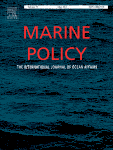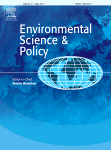Dr. Suzuette Soomai, Postdoctoral Fellow with the EIUI research program, is the author of two new papers that discuss communication of information at the science-policy interface. These papers are based on Suzuette’s doctoral research, which examined the information pathways – production, communication, and use of scientific information – at the operational level in the Canada Department of Fisheries and Oceans (DFO), the Northwest Atlantic Fisheries Organization (NAFO), and the Food and Agriculture Organization of the United Nations (FAO).
Soomai, S. S. (2017). Understanding the science-policy interface: Case studies on the role of information in fisheries management. Environmental Science & Policy, 72, 65–75. http://dx.doi.org/10.1016/j.envsci.2017.03.004
This paper presents a synthesis of the results of case studies of DFO, NAFO, and FAO. The paper describes important drivers, enablers, and barriers to communication in the information pathways – production, communication, and use of information – in the three organizations.
 Soomai, S. S. (2017). The science-policy interface in fisheries management: Insights about the influence of organizational structure and culture on information pathways. Marine Policy, 81, 53-63. http://dx.doi.org/10.1016/j.marpol.2017.03.016
Soomai, S. S. (2017). The science-policy interface in fisheries management: Insights about the influence of organizational structure and culture on information pathways. Marine Policy, 81, 53-63. http://dx.doi.org/10.1016/j.marpol.2017.03.016
This second paper gives particular attention to aspects of the organizational structure and culture in DFO and NAFO (from the perspective of Canada as a Contracting Party) that can act as enablers and barriers to the use of scientific information in decision-making.
The two papers highlight the following key points:
- National, regional, and international policy- and decision-making rely heavily on publications produced by governmental organizations (grey literature).
- FAO functions as a boundary organization as it bridges scientific and policy-making communities in member countries. FAO’s organizational structure and information management processes (e.g., its principle of neutrality, staff who are specialists, and knowledge production through partnerships) promote communication between scientific and decision-making groups.
- Well-defined processes – such as the DFO Canadian Science Advisory Secretariat (CSAS) and the NAFO Fisheries Commission request for advice – produce credible, relevant, and legitimate information for decision-making. However, such processes may still favour traditional single species fisheries management and consequently limit the provision of advice necessary to address newer, complex concerns, e.g., climate change and ecosystem-based approaches to management.
- Trade-offs in the attention given to attributes of information, i.e., credibility, relevance, and legitimacy, are necessary and are always in action at the interface so that the fisheries organizations can be successful in meeting their objectives, e.g., management and governance.
- Organizational structures and cultures are not static; they are evolving in response to the growing recognition of the need to adopt ecosystem-based management approaches. The formation of new NAFO joint working groups of scientists and managers is an example. These changes are often driven by related international policies, and the demand for fisheries science and management to incorporate climate change considerations.
- The involvement of diverse stakeholders, apart from scientists and managers, in decision-making processes, indicates a philosophical shift in organizational approaches to the production of advice. For example, the fishing industry and non-governmental organizations are invited to participate in the DFO CSAS peer review meetings. NGOs are key partners with FAO in information production and dissemination to member countries and in driving activities under global projects. In particular, if the processes are iterative, i.e., two-way communication, the capacity for understanding is enhanced.
- Trust relationships between scientists and managers improve understanding of science and management needs. The increased communication between scientists and managers in the DFO CSAS and NAFO Fisheries Commission request for advice processes and the evolving organizational structures are attributed to these trust relationships.
- Scientific uncertainty at the science-policy interface is generally accepted because of the well-defined processes for producing and communication information, the involvement of multiple stakeholders, and the enhanced trust relationships among actors.
- The path from science to operational decision-making may appear to be linear, however, multiple science-policy interfaces exist. The movement of information between scientific and management groups can follow numerous formal and informal pathways linking a variety of actors.
- Understanding how information flows among multiple actors can guide an organization in evaluating or modifying its production and communication practices.
Suzuette’s doctoral research was supervised by Professor Bertrum MacDonald, along with advisors, Drs. Elizabeth De Santo, Peter Wells, and Boris Worm. The external examiner for her dissertation Dr. Michael Fogarty is a Senior Scientist with the Northeast Fisheries Science Center, US National Marine Fisheries Service, Woods Hole, Massachusetts.

